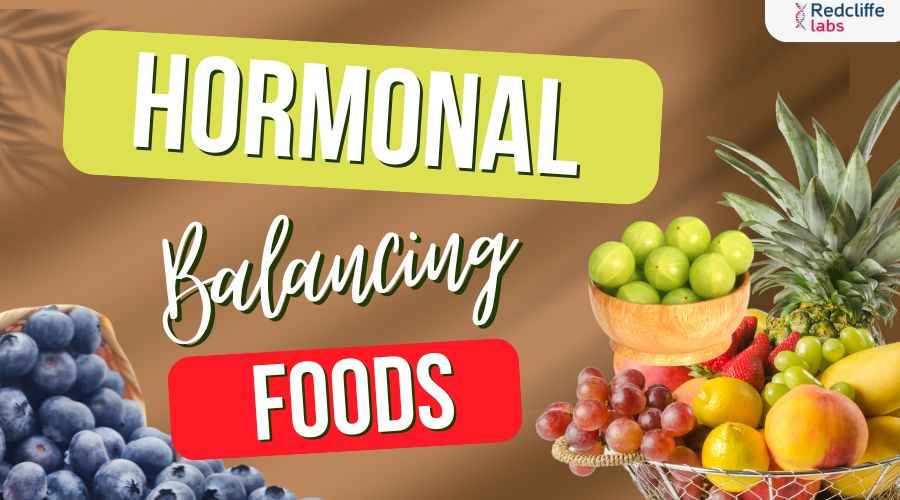Hormone Balancing Foods: The Key to a Healthier You

Medically Reviewed By
Prof. Ashok Rattan
Written By Kirti Saxena
on Feb 6, 2025
Last Edit Made By Kirti Saxena
on Jul 19, 2025

Everyone knows that food impacts your body, but are you aware that what foods you eat greatly affects the regulation of your hormone levels?
Yes, You heard it, right?
Hormones are chemical messengers that significantly impact your mental, physical, and emotional health.
For example, they control your appetite, sleep, weight, and mood. The body produces a great amount of each hormone needed for various processes to keep you healthy.
Any imbalance in hormones may cause serious health issues, such as fatigue, mood swings, weight gain, and even chronic diseases like diabetes, thyroid, and PCOS.
But what factors impact your hormone levels?
Various lifestyle factors, such as stress and a sedentary lifestyle, contribute to hormonal imbalances. Therefore, eating the right foods can help restore balance, while the wrong choices can further disrupt it.
In this blog, let’s explore the best foods to maintain hormonal balance, the foods to avoid, and other natural ways to support your endocrine system.
How does food affect Hormone Levels?
Your food provides essential nutrients influencing hormone production, secretion, and function. Food regulates hormone levels and influences everything from metabolism to mood and reproductive health. Certain foods can promote hormonal balance or disrupt it if they are not good for them.
- Hormones love high-fiber foods like whole grains, legumes, and leafy greens, which help maintain stable blood sugar levels.
- Vitamin C-rich foods (oranges, bell peppers), magnesium-rich foods (nuts, seeds), and herbal teas can lower cortisol levels.
- Flaxseeds, soy, and cruciferous vegetables (broccoli, cabbage) help maintain estrogen balance.
- Healthy fats (avocados, nuts, olive oil), lean proteins, and zinc-rich foods (oysters, eggs) boost testosterone.
- A healthy gut microbiome is crucial for hormone regulation. Probiotic-rich foods like yogurt, kefir, and fermented vegetables help maintain gut health.
A well-balanced diet plays a significant role in hormone health. Make mindful food choices to support overall well-being, maintain hormonal imbalances, and reduce the risk of chronic diseases.
Also Read: Hormone Imbalance: Symptoms, Causes, Tests, and Treatment
Which Foods Help in Maintaining Balanced Hormones?

Knowing which hormone-balancing foods can help to reduce the symptoms of PMS, perimenopause and menopause, PCOS, and other hormone-related issues. Here are some foods you should consume to regulate your hormones. Here are some of the best hormone-balancing foods:
Healthy Fats
Healthy fats such as omega-3s help to increase insulin sensitivity and prevent cortisol levels from rising during stress. They are important for hormone production and overall endocrine function. They provide the building blocks for creating hormones like estrogen, progesterone, and testosterone. Healthy fats are found in
- Avocados
- Olive Oil
- Coconut Oil
- Nuts and Seeds (Flaxseeds, Chia Seeds, Walnuts, peanuts, Almonds)
- Fatty fish
High-Quality Proteins
Consuming proteins in the right amount is extremely important. Protein provides amino acids that your body can't make alone and produces protein-derived hormones- peptide hormones. Peptide hormones help in many physiological processes, such as energy metabolism, growth, appetite, stress, and reproduction.
- Eggs
- Fatty Fish
- Chicken and Turkey
- Lentils and Beans
Fiber-Rich Foods
Consume a fiber-rich healthy diet. Fiber helps regulate digestion, reduce insulin spikes, and eliminate excess estrogen from the body.
- Cruciferous Vegetables (Broccoli, Cauliflower, Brussels Sprouts)
- Leafy Greens (Spinach, Kale)
- Berries
- Avocados
Probiotic and Fermented Foods
Gut health plays a major role in hormone regulation. Probiotics support the maintenance of a healthy gut microbiome, which influences hormone levels. Your Gut contains 100 trillion bacteria, which produce numerous metabolites that may affect your hormone health positively and negatively. To improve your gut health, consume probiotics such as curd, buttermilk, and kombucha.
Adaptogenic Herbs
Stress damages hormones and affects the body in various ways. Cortisol, which assists the body in coping with long-term stress, is also known as the stress hormone.
However, chronic stress can harm the feedback mechanisms that help restore hormonal systems to normal. Adaptogens help the body adapt to stress and support hormones' natural function.
- Ashwagandha
- Maca Roots
- Holy Basil (Tulsi)
Which Foods Can Cause Hormone Imbalance?
Certain foods can interfere with hormone production and lead to imbalances. Therefore, minimizing or avoiding these foods is important to maintain a healthy endocrine system.
- Sugary Snacks and Beverages
- Refined Carbohydrates (White Bread, Pasta)
- Processed Meats
- Non-Organic Dairy
- Factory-Farmed Meat
- Excess Soy (Soy Milk, Tofu, Soy Protein Isolates)
- Excessive Alcohol
- High Caffeine Intake
Other Ways to Manage Hormone Imbalances
Your diet is key to hormone regulation, but besides the food you eat, certain lifestyle factors also play a critical role in maintaining hormonal balance. Here are some additional tips:
-
Regular Exercise
Physical activity strongly influences hormonal health. Exercise improves blood flow to your muscles and increases hormone receptor sensitivity, which enhances the delivery of nutrients and hormone signals.
One of the best benefits of daily exercise is that it helps reduce insulin levels and increase insulin sensitivity. Physical activity also helps regulate insulin, cortisol, and estrogen levels for the best results, mix strength training and yoga.
Stress impacts health in several ways. Cortisol is a stress hormone that helps the body cope with long-term stress. Chronic stress can impair the feedback mechanism that helps return the hormonal systems to normal.
Try managing stress with stress-reducing techniques like meditation, yoga, etc.
-
Manage your weight
Weight gain or obesity directly impacts hormonal imbalances that may lead to insulin sensitivity and reproductive health complications. You can improve your hormonal levels by managing an ideal weight. Studies show that it also reduces the risk of diabetes and heart disease.
-
Get Quality Sleep
No matter what you eat, how consistent your exercise routine is, or whether you are not getting enough sleep, sleep is important for the body to restore the mechanisms for optimal health.
Lack of sleep affects melatonin, insulin, and cortisol levels. Aim for at least 7-9 hours of sleep each night. Poor sleep is linked to hormone imbalances, including insulin, cortisol, leptin, ghrelin, and HGH.
-
Hydrated
Staying hydrated is another best way to maintain your hormone levels. Water aids in flushing out toxins, supports digestion and keeps hormone levels stable. Try to drink at least 8-10 glasses of water daily.

The Final Thoughts
Your hormones play an important role in every aspect of your health, so you must be very specific about what works for your body and what doesn't.
Hormone imbalance may increase your risk of diabetes, obesity, heart disease, PCOS, thyroid, and other health conditions.
Although aging and other factors affect hormones, they are beyond your control. However, you can take several steps, like following a healthy lifestyle, to help manage your hormone levels.
If you think that your hormones are imbalanced, consult a Doctor for a proper diagnosis and treatment plan. You can also take hormone packages for males and females from Redcliffe Labs to better understand the status and conditions of your hormone levels.
Small but consistent lifestyle changes can significantly improve hormonal health, energy levels, and overall quality of life.
Take charge of your hormones today—your body will thank you!
FAQ’s
1. Which food is best for hormonal imbalance?
Foods rich in healthy fats, protein, fiber, and antioxidants can help balance hormones. Include flaxseeds, leafy green vegetables, eggs, berries, broccoli, and yogurt.
2. What fruit is best for balancing hormones?
Berries, pomegranates, and apples can help with hormonal balance.



